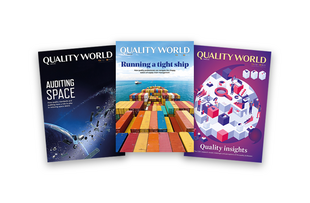
Brexit: Quality challenges facing new supply chains
Progress indicator
Adeyemi Shodipo, director at training and consultancy company Charis Management Systems, explains why the quality profession will play a crucial role post-Brexit.
As the UK begins the Brexit process, the prime minister has mapped out a bold vision to ensure the UK steps up to a new leadership role “as the strongest, most forceful advocate for free markets and free trade anywhere in the world”.
Our supply chain with the EU is well established. Purchasing a raw material from an Italian company is in essence the same as purchasing from a Manchester-based supplier – all you need is a delivery note. Now, companies may have to engage more with three new trading blocs: ‘The First World’, the BRIC countries (Brazil, Russia, India and China) and the developing world.
The First World
Currently there are not many significant barriers to trading with the First World. If we go by the government’s rhetoric, there are plans to further remove these limited barriers post-Brexit by signing individual trade agreements. This means there will still be a free flow of goods and services with nations that produce goods of similar quality to the UK.
Product quality will not be the challenge here, nor will the cost, as these countries are individual brands of their own. The challenge in dealing with the rest of the First World will be productivity – who can make the most for less?
The UK and Japan have the worst productivity in this group. All of the UK’s competitors in the First World, bar Japan, produce more results for every hour of work than the UK. This is where our job as quality professionals makes a difference – we can help the productive economy get more for less.
Quality guru Armand Feigenbaum’s concept of the ‘hidden factory’ demonstrates typically unreported waste in plants and factories, whether it be lost time, lost money or lost effort. Referring to factories in the US, Feigenbaum quoted a figure showing that up to 40 per cent of the capacity of plants is wasted.
Lean techniques such as single minute exchange of dies (SMED), total productive maintenance, Kaizen methods and poka-yoke (mistake-proofing techniques to prevent or detect errors) are helpful tools in addressing this.
ISO 9001 and other international standards might have been sufficient tools in the toolbox of the average quality professional working in an SME. However, as we leave the security of the EU market place and compete with nations that have invested more significantly in the learning and infrastructure for productivity, the UK’s quality professionals need to expand their toolboxes to optimise productivity and increase our chance to compete with the world’s best.
The BRIC nations
During the past few decades, in particular with the rise of China and India, the tendency of consumers to seek more affordable quality products and trade has increased between the UK and the BRIC nations.
A lot of quality assurance expertise has been exported to these countries over time. By spreading the standards of the British Retail Consortium, ISO standards addressing ethical trading, sustainability, and occupational health and safety (among others), there is now a reliable source of supply to the UK market. These countries will challenge the UK with their ability to innovate (affordably) much faster than us.
A perceptibly relaxed enforcement of product, service and business regulations, and the reduced cost of labour in the BRIC nations, combine to make for more agile businesses and a better environment for innovation.
While the UK is likely to keep its fairly tight legislative arrangements, the customer feedback loop has significantly shortened with advances in technology and this can be optimised. The shortened loop should enable us to hear the voice of the customer faster and more clearly and use it effectively in the fast and best design of market-ready new products and services.
No profession is better positioned to structure arrangements for obtaining the voice of the customer and turn business processes from SIPOC (suppliers, inputs, process, outputs, and customers) to outward-facing COPIS (customer, output, process, input, supplier to) – beginning from what the customer wants and setting up a Lean process that is 100 per cent determined by the voice of the customer.
The developing world
Without a concerted effort, which is perhaps government led, it will take a while for countries in the developing world to benefit from trading with the UK. They will have to address significant quality infrastructure deficits in their supply chain.
UK companies will have to provide knowledge to these countries to help standardise west-flowing products, the same as has happened with China and India over the last few decades. There is an almost direct link between economic prosperity and the number of ISO 9001 certified businesses in countries around the world. Many Third World businesses have recently (relative to First World businesses) started discovering the advantage of ISO 9001, with its role in facilitating international trade. The UK on the other hand has near unlimited ISO-competent resources – so many that the cost of implementation today is about a third of what it was in the nineties.
Brexit will be a time for the UK to export its knowledge of standards and standardisation. Through international consultancy activities and the delivery of training and other developmental support services in the new supply chains, Brexit could be an opportunity to open up the developing world. Sourcing from the developing world, however, will enable the UK to be more price competitive among First World competitors.
When we talk of the challenges of productivity, innovation and competitiveness there is one profession that sits squarely at the centre of this – quality.
Adeyemi Shodipo, director at training and consultancy company Charis Management Systems
Member only

This article is free to access for a limited time only. Only CQI and IRCA members receive access to all content.

